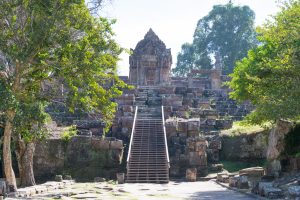Tomorrow, Cambodia’s new prime minister will pay his first official visit to Thailand since taking the reins of power last year, with economic and border affairs likely to top the bilateral agenda.
In a vague statement yesterday, the Cambodian Ministry of Foreign Affairs said that Hun Manet will arrive in Thailand on Wednesday. During the one-day visit, he will meet Prime Minister Srettha Thavisin for talks on “bilateral and multilateral cooperation in areas of common interest” and “preside over the signing of numerous documents on bilateral cooperation.” He will also pay visits to the president of the country’s National Assembly and Senate, and deliver the keynote at a Thailand-Cambodia Business Forum in Bangkok.
Manet’s visit is “an important opportunity for both countries to further strengthen the bilateral cooperation, especially in the economic development of border areas, promotion of two-way trade and investment, closer transportation connectivity, tourism cooperation as well as fostering closer ties between the peoples of the two kingdoms,” the Thai Ministry of Foreign Affairs said in a parallel statement.
Relations between Thailand and Cambodia have had their share of turbulence. Manet was in command of the Cambodian forces posted along the Thai border in 2008-2011, during a period of tension over the Preah Vihear temple. The 11th-century Angkorian temple, which sits astride the two nations’ border, was awarded to Cambodia by the International Court of Justice in 1962, but Thai nationalists reasserted the country’s claim after UNESCO listed the temple as a World Heritage Site in 2008, resulting in numerous armed clashes over the next few years. The two nations also claim sovereignty over around 27,000 square meters in the Gulf of Thailand, which are believed to hold considerable reserves of natural gas.
Despite these areas of tension, Manet and Srettha, who took office in August and September, respectively, should find a lot of areas of agreement. Since taking the baton of leadership from his father, Hun Sen, after 38 years in power, Manet has sought to reset relations with the West and portray his government as open to foreign investment, despite the rash of recent scandals involving Chinese-run mafia syndicates and online scam operations. Srettha, a former real estate tycoon who is concurrently serving as finance minister, has similarly premised his premiership on economic development, wooing foreign firms to invest in Thailand.
It is unclear whether the “border” issues mentioned in both nations’ statements would involve serious attempts to resolve these outstanding disputes. Negotiations over the “overlapping claims area” in the Gulf of Thailand have taken place for years without a resolution, but it is clearly in both nations’ interests to resolve the dispute, which could open the way to the shared exploitation of the resources. BenarNews quoted one Thai analyst as saying that Thailand and Cambodia could conceivably create a Joint Authority for exploration and exploitation, such as the one Thailand established with Malaysia in 1979.
The question of Preah Vihear is less amenable to a lasting solution, given the nationalist passions in play. For Cambodians, the temple has become a symbol of national pride and identity. The wave of nationalist fervor that followed the listing of the temple as a UNESCO World Heritage Site in 2008 likely contributed to the landslide election victory of the ruling Cambodian People’s Party in that year’s election. Thai nationalists are also unlikely to cede claims over the temple, fortified by their own potent myths about the “lost territories” that Thailand was forced to cede to French Indochina and British Malaya and Burma in the late nineteenth century.
Offshore boundaries are in principle solvable, even if no resolution of the issue is likely any time soon. But it is much harder to split the difference on questions of national feeling, and probably the best that can be expected is to freeze the status quo in place so the two nations can focus on more productive areas of cooperation.

































